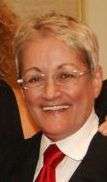Carmen Vázquez
Carmen Vázquez (born January 14, 1949) is an activist, writer and community intellectual.
Carmen Vázquez | |
|---|---|
 Vásquez at the 2011 Vicki Sexual Freedom Award ceremony | |
| Born | January 14, 1949 (age 71) Puerto Rico |
| Education | City University of New York |
| Movement | LGBT rights movement, Immigrant Rights |
Early life and family
The oldest of seven children, Carmen Vázquez was born in Puerto Rico and raised in Harlem. She attended the City University of New York, earning a Bachelors in English and a Masters in Education.[1]
Career and activism
After graduating, Vázquez moved to San Francisco where she lived and worked for almost two decades, becoming a leading activist in causes ranging from immigrant rights to lesbian health.
While in San Francisco, Vázquez co-founded The Women's Building, became the Executive Director of the National Network for Immigrant and Refugee Rights and then the Coordinator of Lesbian and Gay Health Services for the San Francisco Department of Public Health. She was also the co-founder and co-chair of Somos Hermanas, a Central American Women's Solidarity Network.[1]
She returned to New York City in 1994 where she has continued her activist work as Director of Public Policy for the LGBT Community Center (1994-2003), as Deputy Director for Empire State Pride Agenda[2] (2003-2007) and in her current post as Coordinator of the LGBT Health and Human Services Unit of the AIDS Institute, New York Department of Health.[1]
She was the government and public policy director of the New York City LGBT Community Services Center,[3] a founding member of the New York State LGBT Health and Human Services Network, a board member of the National Gay and Lesbian Task Force, a board member of the Funding Exchange's OUT Fund and a Co-Chair of Equality Federation from 2004 - 2006. She was a founder of Causes in Common, a national coalition of LGBT Liberation and Reproductive Justice Activists.[1]
She was honored by CUNY School of Law with an honorary degree in 2004. Her essays have been published in several anthologies. Carmen has served on the Advisory Council of the Woodhull Freedom Foundation since its founding in 2003 and currently serves as the Co-Chairperson of the Board of Directors.[4] She lives in Brooklyn NY.[1]
Writings and bibliography
Some of her work regarding liberation is published in conmoción, a Latina lesbian magazine created in part by tatiana de la tierra to build a platform for Latina lesbian conversation and visibility.[5]
- Simons, George F; Vázquez, Carmen; Harris, Philip R (1993), Transcultural leadership : empowering the diverse workforce, Managing cultural differences series (Boston, Mass.), Gulf Publishing, ISBN 978-0-87201-299-8
- Vazquez, Carmen Inoa (1996), "Spousal Abuse and Violence against Women: The Significance of Understanding Attachment", Annals of the New York Academy of Sciences, no.: New York, New York Academy of Sciences, 789 (1): 119–28, Bibcode:1996NYASA.789..119V, doi:10.1111/j.1749-6632.1996.tb55641.x, ISSN 0077-8923, OCLC 88741009, PMID 8669779
- Razin, Eran; Dijst, Martin; Vázquez, Carmen (2007), Employment Deconcentration in European Metropolitan Areas, GeoJournal Library, 91, Springer, ISBN 978-1-4020-5762-5
References
- "Collection: Carmen Vázquez papers | Smith College Finding Aids". Retrieved 2020-05-26.
- "Pride Agenda names new deputy director". The Advocate. September 16, 2003.
- Ricks, Ingrid (13 April 1999), "She Said, She", The Advocate, p. 48, retrieved 24 March 2010
- "Carmen Vázquez". Woodhull Freedom Foundation. Retrieved 2020-05-26.
- De La Tierra, Tatiana. "Activist Latina Lesbian Publishing: esto no tiene nombre and conmoción." I am Aztldn: The Personal Essay in Chicano Studies, ed. Chon A. Noriega and Wendy Belcher (Los Angeles: UCLA Chicano Studies Research Center Press, 2004) 195.